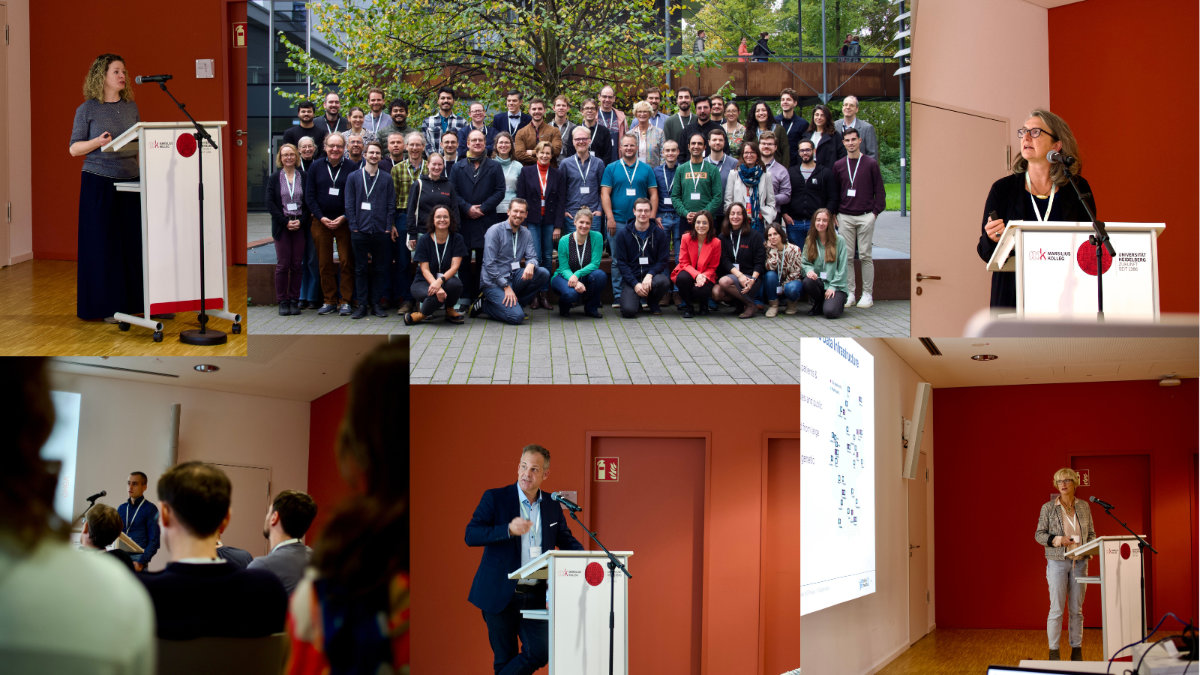Highlights from Our 2024 Annual Meeting
- 18 Oct 2024
Gathering in Heidelberg for our annual event, we brought together GHGA team members, participants, and co-spokespersons from across Germany. Over two days we not only reviewed the past year and successes, but also spent time planning ahead in a workstream overarching fashion.
A major highlight was the public symposium on Sharing Human Genome and Phenome Data in Germany and Beyond. Joined by key partners from initiatives within the GHGA network, we showcased GHGA’s role within the data infrastructure community and strengthened ties with our collaborators.
Oliver Stegle opened the public part of the meeting with an overview of the consortium’s progress and future direction. He discussed milestones, such as the launch of the GHGA Data Portal, and future plans for developing research tools for data analysis within a Secure Processing Environment (SPE), aiming to empower research and feed results back into health care. National partnerships with MV GenomSeq, NAKO, and ITCC were highlighted, along with GHGA’s commitment to promoting FAIR data practices through the Atlas project.
Providing context for GHGA’s international integration with European initiatives such as the European Genomic Data Infrastructure (GDI) and the European Health Data Space (EHDS), Serena Scollen of the ELIXIR Hub delved into these European data infrastructures. Scollen particularly emphasised the importance of expertise, technology, and federation in initiatives such as ELIXIRand the Federated European Genome-Phenome Archive (FEGA). GDI project was highlighted as critical for ensuring interoperability across infrastructures, ensuring global connectivity by using international standards developed by the GA4GH community.
Annette Peters' talk on the German National Cohort (NAKO) focused on multi-omics research and sequencing initiatives, underscoring its role in the Genomes of Europe project. Peters emphasised the importance of harmonisation and the value of learning from other large-scale projects, such as the UK Biobank, and the interest in analysing environmental interactions into genomic data analysis.
Léon Kuchenbecker offered an in-depth look at GHGA's software stack and integration strategy, reviewing key features of the GHGA Data Portal, including authentication, authorisation, and data management. Looking ahead, plans include redesigning the web UI, refactoring the metadata framework, enhancing data submission functionalities, connecting to fEGA, and enabling data analysis within SPEs.
NFDI4Health was introduced by its speaker Julianne Fluck, outlining its mission to develop centralised services for improving data accessibility and harmonisation while addressing challenges like data privacy. She also touched on the signed Memorandum of Understanding between GHGA and NFDI4Health, further solidifying their collaboration. To further build on the connection between the biomedical NFDI consortia, a shared workshop is planned in November.
Finally, Andreas Till from BfArM provided insights into the MV GenomSeq, explaining its objectives, general concept, technologies, and next steps. Till outlined the data platform being developed by BfArM, which includes Clinical Data Nodes, Genome Data Centres operated by GHGA Data Hubs, and the RKI as trust centres. He emphasised the value of this data for research and its potential impact on the health sector.
On the second day, Xenia Ritter provided an overview on new developments within Base4NFDI, followed by a discussion on GHGA’s role within this context. We are excitedly anticipating the development and use of the base services such as IAM, PID, Jupyter, TS. Internal World Café sessions explored various strategic topics, including workflows, the GHGA architecture roadmap, user training, patient engagement, metadata, as well as national and international collaborations. These discussions yielded valuable insights that will inform GHGA’s next steps in development.






